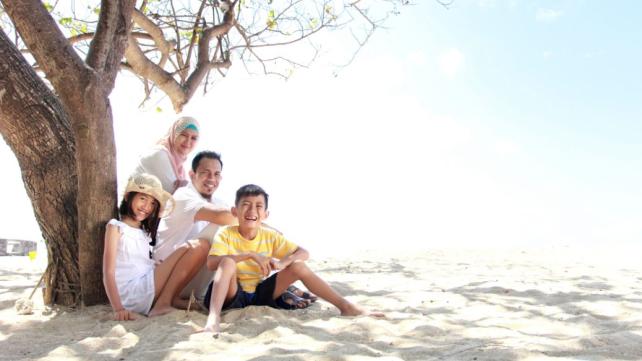
Family vacations are an opportunity to connect, explore, and gain more experiences. When families travel with intent, even easy trips can provide life lessons. Children view new places, try different cuisines, and meet people from different ethnicities. Surely, these experiences open their minds and help them grow. A vacation can be a break from school, but not from learning. Families can use a vacation to gain more knowledge, develop character, and ponder on Islamic values. This article will hone on understanding traveling in an Islamic perspective, science themed vacation, historical themed vacation, and additional tips on how children can learn while traveling.
Understanding Travel
An individual is usually considered a traveler (musafir) when one’s journey is approximately 42 miles (80 km).
Indeed, Allah made prayer (salat) easier during travel. Specifically, the daily mandatory (fard) prayers with exception to fajr and maghrib, is decreased from 4 rakats to 2 rakats (specific unit of prayer). Also, it is suggested for Muslims to pray only the mandatory prayers during traveling.
Ibn Majah (May Allah be Pleased with Him) transmitted the hadith:
“He and Ibn ‘Umar said that God’s Messenger established the practice of praying two rak'as when travelling, they constituting a complete observance and not an abbreviation; and the witr while travelling is a sunna.”
(Mishkat al-Masabih 1350)
Moreover, it is allowed to merge only the early and mid-afternoon prayers (dhuhr and asr) and evening and night prayers (maghrib and isha) while one is traveling.
Surely, Allah makes it easier for Muslims to remain consistent in their prayers without difficulties while traveling to their destination.
Learning Through Nature and Reflection
Spending time in nature helps families learn about science in real life. It can ignite curiosity and teach children how the world operates in a biological, geological, and ecological perspective. For instance, visiting a national park allows children to observe animals, plants, rocks, and water systems in-person. They can observe how leaves change color in different seasons or how fish live and move in the water. These real-life experiences make science learning fun and hands-on. Children can observe how animals live in their natural habitats such as the way that birds build nests or how fish live and move in the water.
One advantage of a science-focused vacation is that children learn to ponder deeply and observe tiny details in the world around them. Parents and children can use easy tools such as binoculars, magnifying glasses, or take photos to make the trip more interesting.
Islamically, nature reminds us of Allah’s creation. Parents can use this opportunity to discuss belief in one God (tawheed), recite remembrance (dhikr), and the beauty of Allah’s creations. Moreover, children might feel a sense of awe when they observe stars, lakes, or mountains which direct them to the greatness of Allah. These moments remind the family that the world is an indication of Allah's mercy and power. Children can learn that science and faith can go hand in hand when exploring Allah’s creation.
Exploring Historical Sites
Exploring history as a family while traveling can be an impactful learning experience. For example, families visiting old cities, castles, masjids, or museums, assist children in comprehending how people lived long ago. It brings history to real life rather than only reading in books. Moreover, a historical family vacation develops curiosity, critical thinking, and admiration for the past. Parents can encourage their children to create a travel journal when they can write or illustrate what they saw about each historical place they visited. Furthermore, parents can show old photos or maps of the site to examine how it appears currently, encouraging observation and discussion.
For example, a family can visit historical or Islamic heritage sites like the great pyramids in Egypt and old masjids in Spain or Turkey. As children walk through these places, they view Islamic art, architecture, and culture. Parents can explain to their children why these places are important. In addition, children learn that Islam has a deep and beautiful history. For example, they might ponder on how Muslims lived with faith despite facing difficult times. This helps them feel proud of their religion and motivates them to be curious learners.
How Children Can Learn While Traveling
Read Signs and Maps: Allow them to read street signs, menus, or maps to enhance their reading and directional skills.
Learn New Vocabulary Words: Teach them easy words or greetings in another language and practice applying them politely. It will help them learn a different language.
Increase Cultural Awareness: Encourage children to observe how people dress, behave, and shop, and live in a different cultural environment. It is likely that they will have a more global perspective.
Create a Travel Collage: Encourage children to take pictures of wonderful sceneries, places, or interesting things they view while being on vacation. When they return home, they can make a travel collage to recall what they experienced and reflect on their vacation.
Purchase a Souvenir: Allow children to select a souvenir and inquire about its origin or significance. This assists them to connect with the culture and recall the vacation in a remarkable way.
Family vacations are an opportunity to bond, deepen faith, and learn from the world around them. With the right mindset, parents can direct their children to become considerate, kind, and grateful Muslims. Travel brings a lot of life lessons. A family vacation becomes a journey of faith, growth, and connection. Truly, the memories and lessons can last a lifetime.
Author bio: Amanda Hasan is a graduate of the University of Toronto (Bachelor of Arts) and Humber College (Law Clerk). She is the author of Joyless, an Amazon novella that tells the story of a lonely teenage girl working at an amusement park. More recently, Amanda copyedited several children's stories for Compass Books. She also worked with Muslim Network TV writing scripts, securing guest speakers, and prepping for interviews. Amanda is currently residing in the Greater Toronto Area with her family.



Add new comment